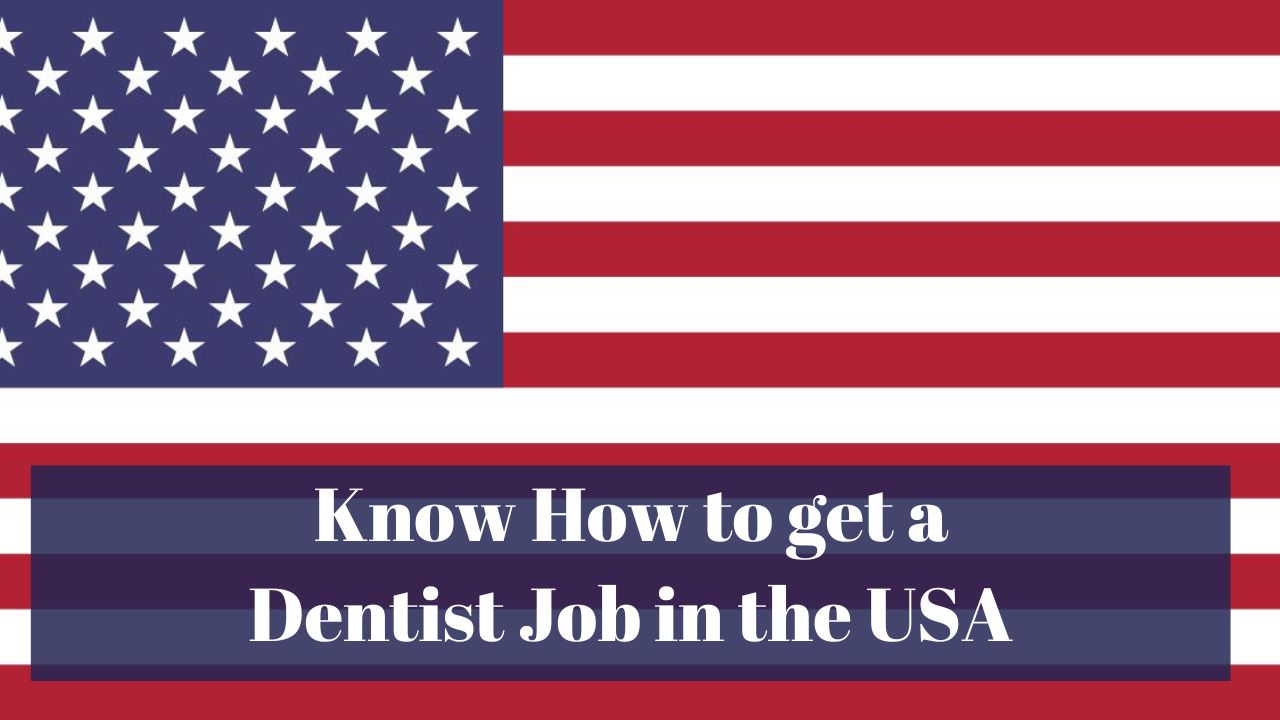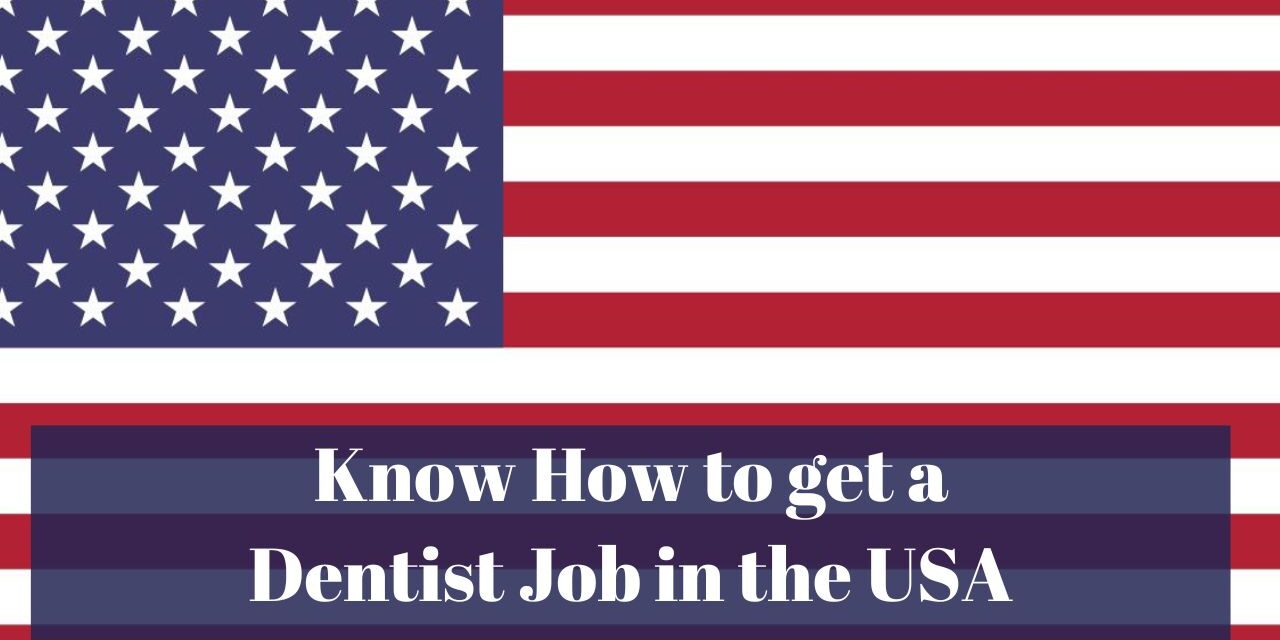Know How to get a Dentist Job in the USA in 2024
Welcome to our friendly guide on how to pursue a rewarding career as a dentist in the United States.
Whether you’re just starting your educational journey or considering a career change, this article will provide you with valuable insights into obtaining a Dentist job in the USA.
-
Education and Degree Requirements
To become a dentist in the USA, there are specific educational requirements that you must fulfill. The first step is to complete a Bachelor’s Degree, preferably in a science-related field. This degree will serve as the foundation for your future dental education.
During your undergraduate studies, it’s essential to complete pre-dental coursework. These courses typically include biology, chemistry, physics, and mathematics. These subjects provide the necessary scientific knowledge that will be crucial in dental school.
After completing your Bachelor’s Degree, the next step is to prepare for and take the Dental Admission Test (DAT).
The DAT is a standardized exam that assesses your academic ability and scientific knowledge. Your performance on this exam will play a significant role in determining your acceptance into dental school.
Once you have completed the DAT, you can apply to dental school. Dental school is a rigorous four-year program that includes both classroom instruction and hands-on clinical experience.
During these four years, you will learn about various dental specialties, such as orthodontics, periodontics, and oral surgery.
After graduating from dental school, you have the option to pursue advanced specialization through postgraduate programs.
These programs offer additional training and education in specific fields of dentistry, such as pediatric dentistry or prosthodontics. While these programs are optional, they can enhance your skills and open up more career opportunities.
-
Licensing and Certification Process
To practice dentistry in the USA, you must obtain a license from the state in which you plan to work.
The licensing process involves several steps, starting with the National Board Dental Examination (NBDE).
This exam assesses your knowledge and understanding of dental sciences, clinical concepts, and patient care.
Once you have successfully passed the NBDE, you can apply for licensure with the State Licensing Board in your desired state.
The application process typically involves submitting various documents, including your dental school transcripts, letters of recommendation, and proof of passing the NBDE.
In addition to the application process, you will also need to pass a state-specific clinical examination.
This examination evaluates your clinical skills and ability to perform various dental procedures.
It is essential to familiarize yourself with the specific requirements of the state in which you wish to practice, as the examination format and content may vary.
After obtaining your dental license, it is important to note that you must continue your education through lifelong learning.
Most states require dentists to complete a certain number of continuing education credits each year to maintain their licensure.
These continuing education courses help dentists stay updated with the latest advancements in dental treatments and technologies.
III. Career Opportunities
As a dentist in the USA, you have a wide range of career opportunities available to you. One option is to start your private practice.
This allows you to be your boss, set your schedule, and build relationships with your patients.
Starting a dental clinic requires careful planning, financial investment, and marketing strategies, but it can be a rewarding and lucrative career path.
Alternatively, you can join an existing dental practice as an associate dentist. This allows you to gain experience and build your patient base before considering opening your practice.
Working in a group practice also provides opportunities for collaboration with other dentists and access to shared resources.
Another career path to consider is public health dentistry. This involves working with underserved populations, such as low-income individuals, children, or older people.
Public health dentists often work in community health clinics, government organizations, or non-profit dental organizations. This career path allows you to make a difference in the oral health of vulnerable populations.
For those interested in academia and research, there are opportunities to pursue teaching positions at dental schools or conduct research in dental sciences.
Many dental schools offer faculty positions where you can educate and mentor future dentists. Research opportunities exist in various areas, including dental materials, oral biology, and clinical studies.
-
Salary Outlook
The salary outlook for dentists in the USA can vary depending on several factors. Location plays a significant role, as the cost of living and demand for dental services can vary greatly from one area to another. Urban areas and regions with a higher cost of living generally offer higher salaries.
Specialization is another factor that influences salary range. General dentists who provide comprehensive dental care tend to have lower average salaries compared to specialists in fields such as orthodontics, oral surgery, or endodontics. Specialists undergo additional training and often have higher earning potential.
Experience level also plays a role in determining a dentist’s salary. Dentists with more years of experience typically earn higher salaries due to their expertise and reputation in the field.
Additionally, dentists who build a strong patient base and establish a successful practice can also expect higher earnings.
It’s crucial to research salary information specific to your area and specialization to have a realistic understanding of the earning potential.
Online resources, such as salary surveys and job boards, can provide valuable insights into average salaries in your desired location.
-
Lifestyle Considerations
Being a dentist in the USA offers certain lifestyle considerations that may appeal to individuals seeking work-life balance.
Unlike some healthcare professions that require on-call or round-the-clock availability, dentistry typically allows for more flexibility in scheduling appointments and managing patient load.
Many dentists choose to work four or five days a week, leaving weekends and evenings free for personal time and family commitments.
This flexibility allows dentists to maintain a healthy work-life balance and pursue hobbies and interests outside of their profession.
Moreover, being a dentist provides personal fulfillment by helping others achieve optimal oral health.
Dentists have the opportunity to improve patients’ smiles, alleviate pain, and enhance their overall well-being.
The ability to make a positive impact on people’s lives can be immensely rewarding and contribute to a sense of professional satisfaction.
Conclusion
Pursuing a career as a dentist in the USA offers numerous opportunities for personal and professional growth.
The educational requirements, licensing process, and career paths outlined in this guide provide a comprehensive overview of what it takes to become a successful dentist.
Remember, the journey to becoming a dentist requires dedication, hard work, and a passion for oral health.
If you are interested in pursuing this rewarding career, take the first step by researching dental schools, connecting with practicing dentists for mentorship, and preparing for the necessary exams.
By choosing a career in dentistry, you have the chance to make a lasting impact on the oral health and well-being of individuals in your community.
Embrace the challenges and rewards that come with being a dentist, and embark on a fulfilling journey towards a successful and meaningful profession.
Thank you for visiting Jobs Ada






